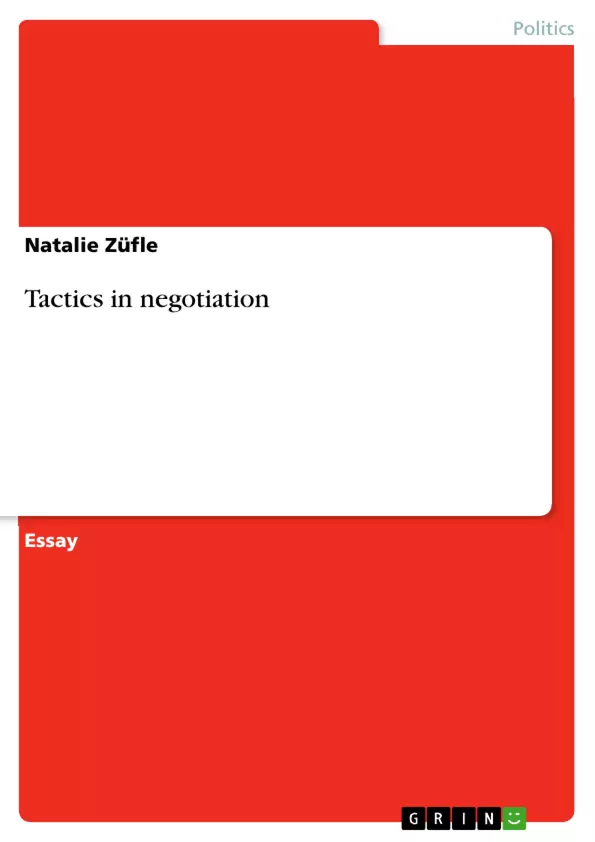Every tactic has its pros and cons. In one situation it is the apt one, in another it may be totally inappropriate.
Inhaltsverzeichnis (Table of Contents)
- Fixing proportionalities
- Good cop and bad cop
- Escape into ideologizations
- One-text approach
Zielsetzung und Themenschwerpunkte (Objectives and Key Themes)
This essay examines the effectiveness of four negotiation tactics in real-life situations, drawing examples from both international relations and personal experience. The author analyzes the tactics of fixing proportionalities, good cop/bad cop, escape into ideologizations, and the one-text approach, evaluating their effectiveness in achieving desired outcomes.- Effectiveness of negotiation tactics
- International relations and personal experience examples
- The role of context in the success of negotiation tactics
- The limitations of specific tactics in different situations
- The importance of considering long-term relationships and credibility in negotiations
Zusammenfassung der Kapitel (Chapter Summaries)
Fixing proportionalities
This tactic, often employed in compromising strategies, seeks to find solutions by allocating shares, particularly in distributional conflicts. The example of Lebanon's power-sharing system based on religious confession illustrates this tactic. While it initially provided stability after the civil war, it has become a cause for political delays and blockages. The author suggests that this tactic may be more effective as an interim solution during transitions from conflict to more stable political systems.Good cop and bad cop
This tactic, which falls under competing strategies, involves one negotiator adopting a hostile and demanding role (the "bad cop"), while the other takes on a more friendly and accommodating role (the "good cop"). The aim is to leverage fear and naivety to gain concessions. The essay argues that this tactic can be effective in specific contexts like police interrogations, but it is less successful in complex international negotiations involving professional negotiators.Escape into ideologizations
This tactic, typically associated with evasion strategies, involves using ideological arguments to avoid making concessions. The example of the Arab/Israeli conflict demonstrates how both sides repeatedly resort to their ideologies to circumvent concessions. This tactic ultimately prevents solutions and hinders progress towards resolution.One-text approach
This tactic, belonging to the cooperative strategies category, involves creating a single draft agreement by a mediator and then collaboratively amending it until all parties reach consensus. The Doha Agreement, which ended the Lebanese political crisis, exemplifies this tactic. The author argues that this approach is highly effective in multiparty/multinational negotiations due to its time-saving and conflict-reducing nature.Schlüsselwörter (Keywords)
The essay focuses on key concepts related to negotiation tactics, their application in international relations and personal experiences, and their effectiveness in achieving desired outcomes. Key terms include: negotiation strategies, competing, collaborating, yielding, evasion, compromising, fixing proportionalities, good cop/bad cop, escape into ideologizations, one-text approach, distributional conflicts, confessional power-sharing, political stalemate, international negotiations, multiparty negotiations, diplomacy, and the Arab/Israeli conflict.Frequently Asked Questions
What is the "Good Cop and Bad Cop" tactic?
It involves one negotiator being hostile (bad cop) and another being friendly (good cop) to leverage fear and naivety for concessions. It is effective in police work but less so in professional diplomacy.
How does the "One-text approach" work?
A mediator creates a single draft agreement that all parties collaboratively amend until a consensus is reached. It is highly effective in complex multinational negotiations.
What is "Fixing proportionalities" in negotiation?
This tactic seeks solutions by allocating shares in distributional conflicts, such as Lebanon's power-sharing system. While providing initial stability, it can lead to political stalemate.
What is meant by "Escape into ideologizations"?
It is an evasion strategy where parties use ideological arguments to avoid making concessions, often seen in the Arab/Israeli conflict, which can hinder progress.
Why is context important for negotiation tactics?
The essay argues that a tactic may be appropriate in one situation (like a transition period) but totally inappropriate or harmful in another (long-term political stability).
- Arbeit zitieren
- Natalie Züfle (Autor:in), 2009, Tactics in negotiation, München, GRIN Verlag, https://www.grin.com/document/180103



